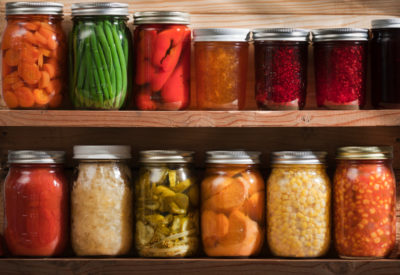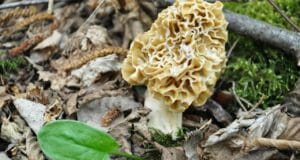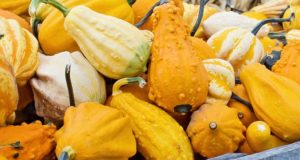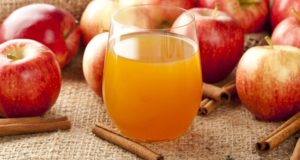
Image source: anorganicconversation.com
Most of us eat fermented foods without even knowing it. Condiments you use such as ketchup and soy sauce, the sauerkraut or pickles you might add to a sandwich, the yogurt you eat for breakfast, and the beets you toss in your salad are all examples of fermented foods.
Fermentation is nothing new. In fact, people all over the world have been preserving their foods by fermentation for thousands of years. Archaeologists have found evidence of fermented foods and drinks in Babylon (5000 BC), Egypt (3150 BC), South America (2000 BC), and Sudan (1500 BC). Unfortunately, while our grandparents and great grandparents may have had cellars full of jars of pickles, beets and sauerkraut, fermentation is a lost art for most Americans today.
So what exactly is this process? The technical definition of fermentation by biology-online.org is “an anaerobic (without oxygen) cellular process in which organic foods are converted into simpler compounds and chemical energy (ATP) is produced.”
Basically when fermentation occurs, a food’s sugars and carbohydrates are converted into something else. Grains turn into beer, carbohydrates turn into carbon dioxide to leaven bread, and grape juice turns into wine. The most common fermented foods and drinks are wine, beer, pickles, yogurt, beets, sauerkraut, certain cheeses, kefir, sour cream, sourdough bread, miso, kimchi and kombucha.
Make “Off-The-Grid” Super Foods Secretly In Your Home
Fermentation expert Sandor Katz offers another definition in his book The Art of Fermentation. He describes fermented foods as “the flavorful space between fresh and rotten.”
Whichever definition you prefer, there is no denying that fermented foods should have an important place in your diet for both health and efficiency reasons. In today’s world of convenience and speed, however, many of us have lost the art – and, as a result, the benefits – of fermented foods. We need to get it back.
Here are some of the reasons to include fermented foods in your diet:
- Fermentation is an inexpensive and energy efficient form of preservation.
- Fermented foods can help to reduce high cholesterol levels in our blood.
- Fermented foods have beneficial bacteria that are important for digestion and stomach health.
- Fermented products often contain higher levels of vitamins – especially thiamine, nicotinic acid, biotin and riboflavin — and proteins. According to a study published by the International Journal of Food Science & Technology, for instance, fermented dairy products have an increased level of folic acid (important for pregnant women) as well as significant amounts of B vitamins, riboflavin and biotin.
- Fermented foods often contain a higher level of convertible energy than non-fermented foods of the same weight.
- Fermented foods are rich in enzymes, which help the body digest and absorb the food you eat.
- Fermentation increases the taste and flavor of many foods.
You can purchase naturally fermented foods at some retail stores or at your local growers’ market, but the best way to reap all the cost and health advantages they offer is by making them yourself. You will find that with some practice, fermenting foods for your own use can be an easy and gratifying process. For one thing, you don’t do most of the work, the healthy bacteria does!
The general steps of fermenting vegetables include:
- chopping the vegetables (such as cabbage, carrots and onions) in any way you wish.
- mixing in salt (and sometimes whey).
- mashing and/or squeezing the vegetables until all their liquid runs out.
- transferring the mixture into a glass jar (avoid metal or plastic containers).
- pressing the vegetables into the jar so that they are submerged in their own liquid (with the brine at the top of the jar).
- covering the jar and letting the jar sit for several days. Taste test some of the kraut after two to five days. If you are not pleased with the flavor, let the jar sit another few days and then taste the mixture again. It really is up to you and your taste preferences.
Here are some additional tips from author and fermentation expert Katz:
Check the jar regularly to make sure the veggies are still submerged, adding water to the jar if necessary.
You may need to periodically release the pressure that builds up in the jar by opening and shutting the lid.
It is common for surface molds to develop. If they do, simple scrape away any kraut that is discolored and add them to your compost pile. The kraut below is safe to eat because the high acidity level created in fermentation kills the organisms that could cause food-poisoning.
Fermented foods are healthy, affordable and easy to make. That’s a pretty unbeatable combination, don’t you think? There are a number of helpful videos online about how to ferment foods at home.
In addition, here are three recently published books on fermentation to help you get started:
The Art of Fermentation: An In-Depth Exploration of Essential Concepts and Processes from around the World by Sandor Ellix Katz. Publisher: Chelsea Green Publishing; First Edition (May 14, 2012)
Real Food Fermentation: Preserving Whole Fresh Food with Live Cultures in Your Home Kitchen by Alex Lewin. Publisher: Quarry Books (July 1, 2012)
Mastering Fermentation: Recipes for Making and Cooking with Fermented Food by Mary Karlin. Publisher: Ten Speed Press (August 27, 2013)
 Off The Grid News Better Ideas For Off The Grid Living
Off The Grid News Better Ideas For Off The Grid Living




